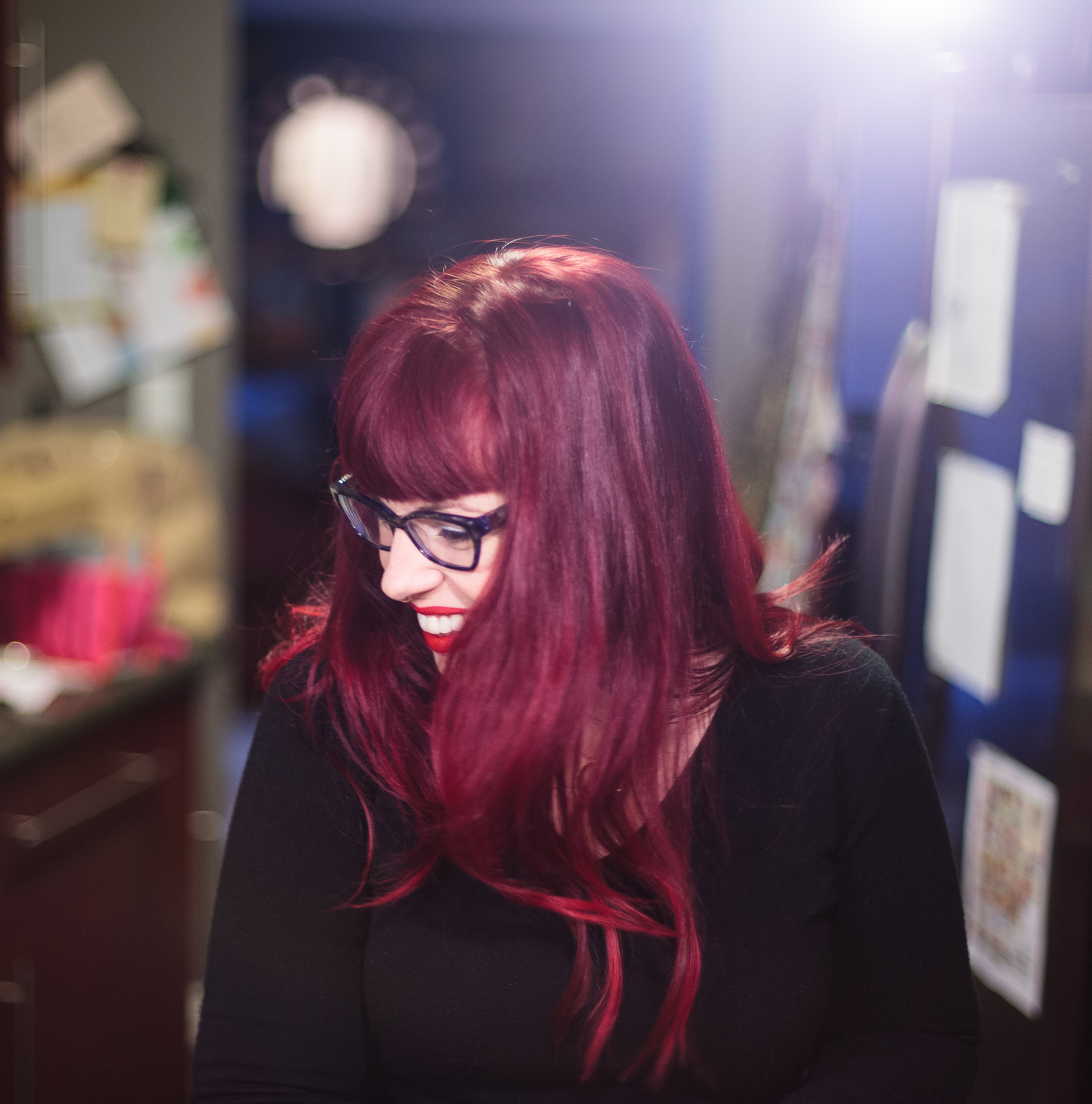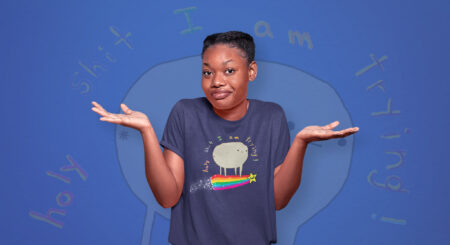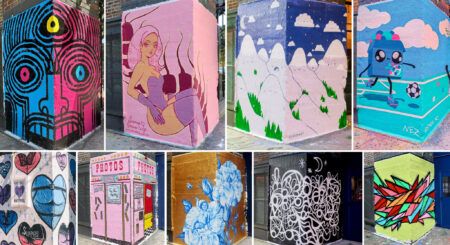“Are you non-compliant, bitch?! Heck yeah, you are! xoxoxoxo”
This is the gift message I included when I bought one of my closest girlfriends a copy of Bitch Planet, Vol. 1: Extraordinary Machine as a Christmas present. I was given the first issue of Bitch Planet by my other closest girlfriend when I went to visit her last summer for a mini-vacation away from my kids. It was sitting there on the guest bed, waiting for me.
I don’t normally mention my personal relationship with the work of the women creators I interview. However, I feel that my own experience with Bitch Planet, Kelly Sue DeConnick’s feminist comic about a futuristic society that sends women to a prison on a colonized planet for being non-compliant, is fitting—the passing it on to friends, the shared excitement over its aggressive honesty.

Although working in comics for over a decade as a writer and editor, Kelly first became notorious for her part in the recasting of Carol Danvers (previously Ms. Marvel) as Captain Marvel. This rebranding included Jamie McKelvie’s revamped outfit design – a less-sexualized, more pragmatic flight-suit. Kelly’s time writing Captain Marvel was lauded and admired by critics and fans, as well as criticized for having a feminist agenda. Kelly responded to this backlash with, “This is not angry feminist. You want to see angry feminist?”
 Kelly ultimately co-created Bitch Planet with artist Valentine De Landro. It is a furious comic about the way society boxes women in, demanding the absurdly impossible of them. The familiarity of ‘non-compliance’ (a woman can be considered non-compliant for being too fat, too opinionated, too black, too sexual, etc.) was so recognizable and resonated so deeply with women that it is already becoming a pop culture symbol for feminism and empowerment, with many women getting “NC” tattoos.
Kelly ultimately co-created Bitch Planet with artist Valentine De Landro. It is a furious comic about the way society boxes women in, demanding the absurdly impossible of them. The familiarity of ‘non-compliance’ (a woman can be considered non-compliant for being too fat, too opinionated, too black, too sexual, etc.) was so recognizable and resonated so deeply with women that it is already becoming a pop culture symbol for feminism and empowerment, with many women getting “NC” tattoos.
So it shouldn’t come as a surprise that Bitch Planet has been nominated in the Best New Series category for this year’s Eisner Awards.
In March, Kelly started #VisibleWomen “to disabuse folks of the notion that women comic artists are rare, to get eyes on said artists & to get them work.” She is also one of the co-founders of Creators for Creators, a nonprofit that the founders hope will “become a resource for the comics industry.” It is offering a 30K Grant, along with mentoring, to either a cartoonist or a writer/artist team to help them create a new comic. (You can check out the submission guidelines HERE).
Kelly is also currently writing Pretty Deadly, a mythic and vicious western series she co-created with artist, Emma Ríos. Critically and commercially successful, the series has received several Eisner Award nominations, including Best Writer, Best Cover Artist, Best Penciller/Inker, and Best Coloring.
First, tell me something about yourself—anything you want.
I like hot sauce on everything except ice cream.
Can you describe your creative process?
There’s a lot of hugging my knees and rocking back and forth and crying and thinking I’m a fraud. It’s an integral part of my process. And giving up and just figuring I’m a failure and everyone is going to find out—that’s also important.
The nuts and bolts of it though is I’m most successful when I get up early in the morning before everyone else does to write. My most successful days begin at 3AM. I have not had a lot of those days of late, and I can feel the panic rising.
So I’ll get up early on an ideal day and then when my kids get up, I take some time off and get them fed and their hair brushed. Then by 8 o’clock they’re off to school and our staff comes in. After that, there’s a lot of editorial work and a lot of answering of email (way more than I wish there was; I sometimes feel like I’m a professional answerer of emails who occasionally gets to write). Then there’re meetings and that sort of thing. Then the kids get home, usually between 3:30 and 4PM. We have family time for the rest of the evening and then it repeats.

Let’s talk about “feeling like a fraud” and doubt. In your public image, you come across as confident and assured. How do you work through the doubt to write stories that are so in-your-face and powerful?
I don’t know that there’s an easy answer. When you’re trying to write, you’re trying to write the truest thing you can think of, and you police yourself for when you’re bullshitting. And if you catch yourself writing something that doesn’t feel true (it’s fiction so it’s all lies) but in that ‘capital T’ sense and it’s not coming from a genuine place, then you know you have to cut it. I try not to think too much about other people’s reactions to my work. It isn’t easy, but no one is going to be universally liked, and if you’re not pissing someone off, then you’re probably not pushing hard enough.

Whether anyone likes or dislikes my work is fairly irrelevant. As a human being, I want people to like it, but my job as a writer isn’t to worry about that. In fact, worrying about that is counterproductive. That is the most paralyzing thing you can possibly do.
You are writing for yourself. In comics, you are writing for your artists. You trust your editor, your gut, and after that, whatever people do with it is up to them. When you start trying to control things that aren’t yours to control, like what other people think of your work, you are not doing your job. That’s those peoples’ thoughts and they’re entitled to them, and you should shut the fuck up and sit down.
One more things about your public persona: I see you as becoming an icon of “coolness” for women. How do you feel about this perception?
Talking about how you are perceived is wildly uncomfortable. I don’t know how cool I am. I’m a forty-five-year-old white mother of two. My hip quotient is not so high. I don’t think about whether I’m cool or not. I think what people respond to is actually just something that comes with age.

I think there are are two things that people respond to, actually—I think one is that I try to be honest and understand that sometimes the honest answer is I don’t know, sometimes the honest answer is I have contradictory feelings on this, sometimes the honest answer is I’m figuring that out. And that is something people respond to because I think that’s where we all are, but it’s hard to say it out loud.
The other thing that I think people respond to is I’m forty-five years old. I don’t care if you like me. And that is incredibly fucking liberating. This is a thing I wish happened to women when they are younger.
When you stop giving a shit whether a stranger on a fucking bus thinks you are attractive, you find your goddamn wings.
If I worry about how attractive I am, it is for me and my husband. But frankly, less so for him. I love my husband, I want him to find me attractive, but I want him to care about me for who I am. And really, in regards to physicality, which is a representation of me taking care of myself as an expression of self-love more than the actual aesthetics, my husband loves me because he sees me loving myself. Beyond that, who has the fucking time?
I will talk until someone cuts me off, but I’m not interested in what you think of it.
Exactly! That is how I think people perceive you, how I perceive you—as a person who puts out, “I don’t care what you think, I’m going to be who I am.” That’s exactly what I mean when I say “cool.”
We’re social creatures. Everyone wants to be liked. But when it comes down to whether I’m going to put my energy into everyone liking me or putting my energy into authentically being who I am and trying to be a good member of my community and trusting my own sense of ethics, of what it means to be a good friend, I’m going to pick the latter—if you don’t like me for those things, then I can’t spend my energy trying to be the things that you like.
And I certainly can’t change my work. And if you don’t like it, DON’T BUY IT!


Let’s do a few fun questions. In a fight between purple and pink, which win and why?
This is sorta like who would win between Captain Marvel and Wonder Woman. They’re both good, so they wouldn’t fight.
Periodic Table, City Map, or Color Wheel?
City Map, because it has more information.
If you could design a t-shirt, what would you have on it?
“Work Hard” but printed in reverse so when I looked in a mirror I could see it.
Both you and your husband, Matt Fraction (author of Sex Criminals and Hawkeye), write successful comic book series and have busy schedules with a family. How do you handle the work/life balance?
Not very well, and I don’t know anyone that does. And if there is any message of comfort I have to give, I don’t think I know anyone who isn’t struggling with this. It is still something that disproportionately falls on women but by no means is an issue exclusive to women.
There’s a book, Overwhelmed by Brigid Schulte that I highly, highly recommend. It doesn’t really offer any answers, but it offers all kinds of studies and experiential stories that will make you feel like you are not alone and that you are not crazy in thinking this is very new, the level of information coming in and how busy we are these days.

As far as between myself and my husband, my husband is a very nurturing, participatory father, so parenting is a very 50/50 experience in our house. Splitting parenting is a non-issue, except for the fact that I know how rare that is and that our social programming is still such that I will find myself saying things like “Matt is watching the kids for me so I can go do this,” as though he is a babysitter taking over my responsibilities. Which is not how he thinks of it, and it is certainly not the case, he’s their father, but it’s in our cultural programming that childcare is the woman’s job and when someone else does it for her, they are doing her job. I try to recognize it for myself when I have that impulse. I am going out town this weekend, and I have an inordinate amount of guilt about the fact that Matt is going to be on his own for the weekend, even though I know he’s absolutely capable of it. And I certainly was able to handle the kids when he was out of town, and I didn’t think I was doing his job.
I guess, sometimes a way of thinking takes time to get used to. You know what I mean?

Yes, I do. My husband and I have conversations like these all the time.
You know, I have a friend, who was doing…..everything. Absolutely everything. She was a super-mom. It turned out that she had a secret addiction to amphetamines that was allowing her to do all these things and it was destroying her body. She had this incredibly unreasonable expectation of what she was supposed to do and felt like a failure when she couldn’t do it all, so she put herself on fucking drugs to be able to be super-human and then collapsed because you cannot maintain that lifestyle.
Yeah, that’s what we’re doing with ourselves.
Hearing stories like that always makes me tremendously sad, because women are literally killing themselves to be all these things at once. Do you think that the reason people love Bitch Planet so much is because you are tapping into that collective exhaustion that we all feel?
Oh, absolutely. People who read the book only on the top level understand non-compliant as a revolt, like “I will not do as I am told.” But it’s not a verb, it’s a noun.
 You don’t label yourself non-compliant, the world labels you non-compliant, because you are not good enough, you are not all the things you are told to be. The dirty little secret is that there is no compliant woman. You can’t do it. It’s impossible. That’s why all of the compliant women are pink; they’re holograms—that isn’t achievable. There are so many contradictory expectations and demands that are placed on women. And so many are vile and go against our humanity—and they’re insidious. And when we’re not being policed by men or the fucking state, we do it to ourselves.
You don’t label yourself non-compliant, the world labels you non-compliant, because you are not good enough, you are not all the things you are told to be. The dirty little secret is that there is no compliant woman. You can’t do it. It’s impossible. That’s why all of the compliant women are pink; they’re holograms—that isn’t achievable. There are so many contradictory expectations and demands that are placed on women. And so many are vile and go against our humanity—and they’re insidious. And when we’re not being policed by men or the fucking state, we do it to ourselves.
I think that the message of Bitch Planet is “You can’t win, don’t play.”
Or change the fucking rules.

Do you have a profession, outside of your own, that you admire?
Oh, my god, all of them! I’m a people-person. I’m very interested in people and what people do. I haven’t worked retail in twenty years, but I had a nightmare of working retail last night, and I realized I have that nightmare every once and while. That is a thing I still can’t shake.
I have this tremendous respect for people who do that for a living—who have stores and care about them. My books wouldn’t be in the hands of readers if there weren’t people to sell them.
If I could pick any talent, I would want to be a stand-up comedian, because they are incredibly powerful.
I think there are politicians in it for the wrong reason; we spend almost all our time talking about those politicians. I think there are probably more politicians who are servants, who really believe that they can make the world a better place, and they give up a tremendous amount of personal autonomy and freedom so we can make fun of them, distrust their motives, second-guess every decision they’ve ever made, and mock them when they change their minds.
I love the people, all of the people.

Lastly, do you have any advice for aspiring artists or writers?
Do the work.
Everybody puts the cart ahead of the horse, trying to figure out who to pitch to, how to market the book, before they have done the work.
Do the work. Do the work. Do the work.
Women & Comics is a monthly interview series. You can read past interviews with Nicole J. Georges, Lucy Knisley, Eleanor Davis, and Julia Wertz.







